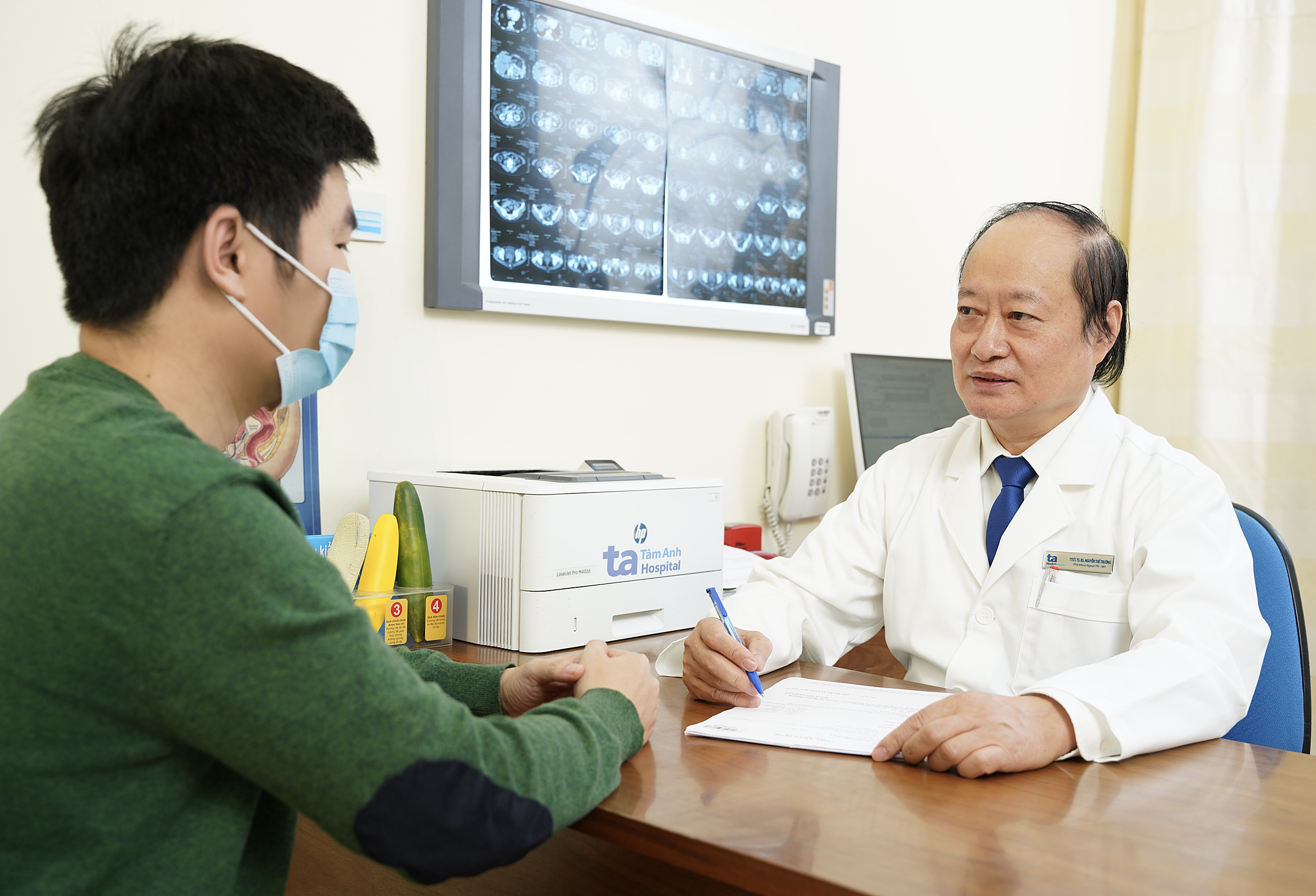The prostate, an organ exclusive to men, sits below the bladder, encircling the urethra. It plays a crucial role in producing fluid that nourishes and transports sperm. When this gland becomes inflamed, men can experience various urinary, sexual, and reproductive health issues. Common symptoms include difficulty urinating, frequent urination day and night, a burning sensation during urination, a dull ache in the lower abdomen, perineum, or lower back. Some men also experience decreased libido, erectile dysfunction, or painful ejaculation.
Dr. Nguyen The Truong, Deputy Head of the Department of Urology and Andrology at Tam Anh General Hospital in Hanoi, said that men with prostatitis are often complacent because the initial symptoms are usually mild or fleeting. These signs are also easily mistaken for urinary tract infections or benign prostatic hyperplasia, leading to delays in seeking medical attention and allowing the disease to progress.
 |
Dr. Truong examines and advises a patient. Photo: Tam Anh General Hospital |
Dr. Truong examines and advises a patient. Photo: Tam Anh General Hospital
Dr. Truong explained that acute prostatitis, when detected and treated early with the correct regimen, usually recovers quickly. Conversely, if prolonged, it can become chronic, recurring frequently, causing prostate fibrosis, affecting semen production, and potentially leading to infertility. In some severe cases, it can cause prostatic abscesses, sepsis, or spread to nearby organs. Besides impacting physical health, the disease also significantly affects mental well-being and sexual life.
The causes of prostatitis are quite diverse, the most common being infection due to bacteria entering from the urinary tract. When the bladder is infected or inflamed, stagnant urine becomes a breeding ground for bacteria, which can then spread to the prostate. This is common in people with a history of neurogenic bladder, urethritis, or benign prostatic hyperplasia. The disease can also stem from sexually transmitted infections when bacteria causing urethritis travel upstream, invading the prostate and other reproductive organs. Unsafe sex and poor hygiene after intercourse increase the risk.
Non-infectious prostatitis also occurs, usually as a consequence of pelvic trauma or surgery in this area. Mechanical impacts can cause tissue damage, nerve compression, and lead to chronic pain in the lower abdomen and perineum. This condition is also known as chronic pelvic pain syndrome, for which there is currently no definitive cure, primarily focusing on symptom management and improving the patient's quality of life.
According to Dr. Truong, treatment for prostatitis typically combines antibiotics with supportive measures and lifestyle changes. People with mild, bacterial acute prostatitis can be treated as outpatients, with medication response monitored at home. Patients need to take the full course of antibiotics for the prescribed duration to eliminate the bacteria, combined with anti-inflammatory and pain-relieving medications to improve symptoms. Some cases are prescribed alpha-blockers to reduce pressure at the bladder neck and inside the prostate, facilitating easier urination.
If the patient exhibits severe signs such as high fever, urinary retention, or intense pain, doctors recommend inpatient treatment for close monitoring. With chronic bacterial prostatitis, treatment is often prolonged, and even if symptoms subside, patients must adhere to the full treatment plan to prevent recurrence.
Men should drink plenty of water, avoid holding urine, limit bladder-irritating beverages (such as alcohol, beer, coffee, strong tea), reduce spicy and hot foods, maintain physical activity, and avoid prolonged sitting or continuous cycling, which puts pressure on the perineum. Moderate, safe sex and good personal hygiene also reduce the risk. Men with unusual urinary symptoms should have regular urological checkups. Early examination helps timely detection of prostate diseases, effective treatment, and prevention of complications.
Thu Giang
| Readers can submit questions about urological diseases here for doctors to answer. |












